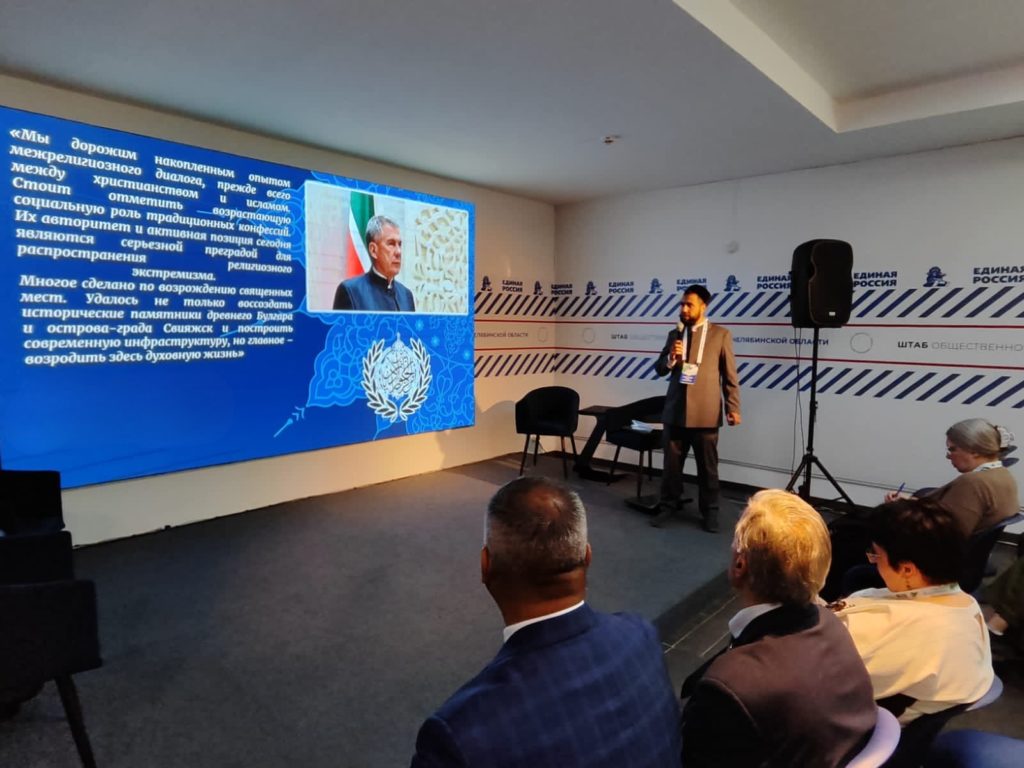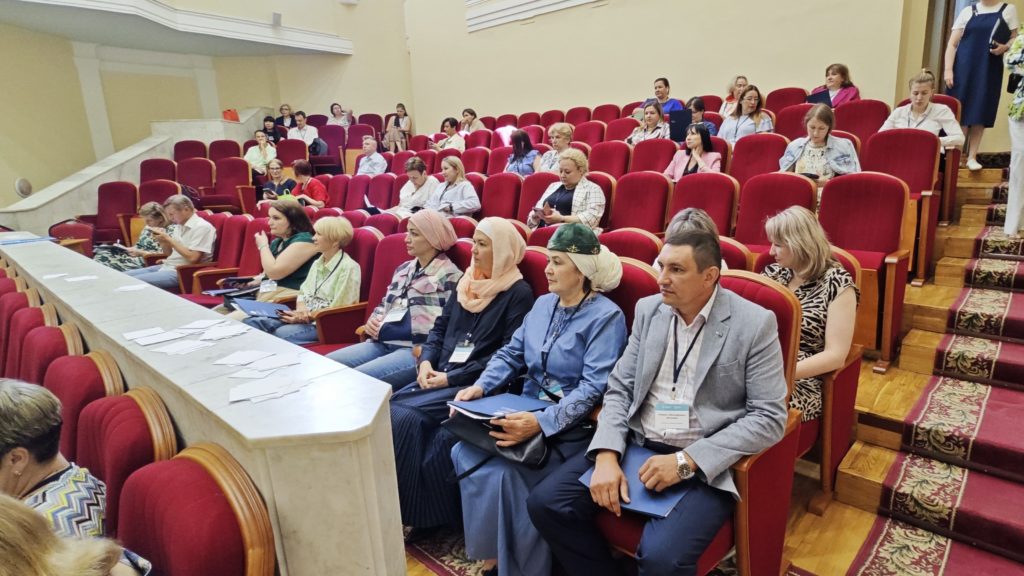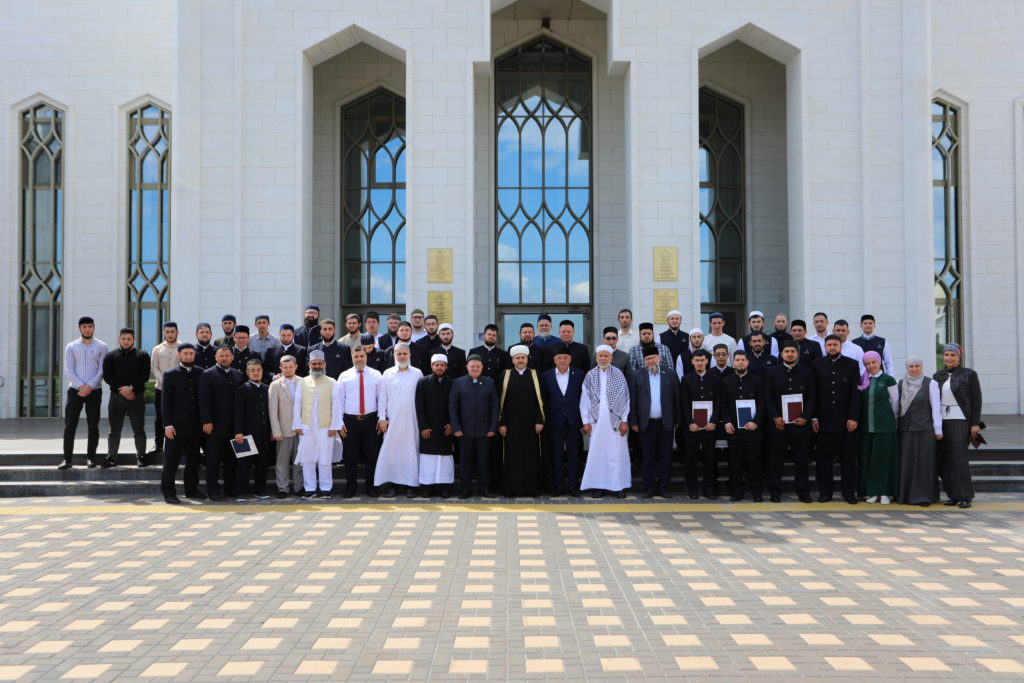All-Russian Scientific and Practical Conference “Islamic Education in Russia in XXI century: Results and Perspectives” is held in St. Petersburg on 21-24 November. The event is organized by St. Petersburg State University and the State Hermitage, with the support of the Foundation for the Support of Islamic Culture, Science and Education. The conference is attended by representatives of religious and governmental educational institutions implementing programs in the field of Islamic studies and theology, researchers and scholars. Our university is represented at the event by the staff and students of the Bolgar Islamic Academy.
The conference participants were greeted by Mikhail Piotrovsky, Director General of the State Hermitage and Dean of the Faculty of Oriental Studies at St. Petersburg State University, academician of the Russian Academy of Sciences. He noted that the long experience of St. Petersburg State University can be an example and model for other institutions, universities, and confessions.
“Today we began our meeting in an unusual way – with a visit to the Islamic expositions of the Hermitage – and this makes two sense. The first is art as a sphere where there is a dialogue between people of different views, because art is beautiful, it is a language that everyone understands. The second is the Hermitage approach to telling about the art of Islam. This approach is connected with fundamental understanding of Islam as polyphonic religion with combination of particular and general. What we call Russian Islamic heritage is very important to us. We have a busy year: we celebrate the 1,100th anniversary of the adoption of Islam by the people of Volga Bulgaria. The Hermitage will hold an exhibition on this occasion,” said Piotrovsky.
Marina Lavrikova, First Vice-Rector for Academic Affairs at St. Petersburg State University, also delivered a greeting message from Nikolai Kropachev, Rector of St. Petersburg State University. Speaking about the successful implementation of the program of training personnel with in-depth study of Islam, Lavrikova recalled the creation of the Center for Islamic Studies at SPBU, which is successfully functioning today.
“We understand the general humanitarian component of this project, we understand how important it is to help our partners from Islamic universities, which bear the main burden of training such specialists. We understand the importance of the exchange of scientific and methodological developments and will continue to do so”, – concluded Marina Lavrikova.
A greeting on behalf of First Deputy Chairman of the Spiritual Administration of Muslims of the Russian Federation, Rector of the Moscow Islamic Institute, Director of the Center for Islamic Studies of St. Petersburg State University, Doctor of Theology Damir Hazrat Mukhetdinov, read out First Vice-Rector of the Institute Timur Fahretdinov.
“The St. Petersburg school of Oriental Studies has produced a generation of outstanding scholars, many of whom have had Muslim roots, and their names have been forever etched in gold in the history of St. Petersburg University. Among them is Husain Faizkhanov, whose works were enriched with historical, philological and theological knowledge, and whose 200th anniversary will be celebrated in Russia in 2023,” cited Timur Fahretdinov.
Ainur Timerkhanov also participated in the plenary session. In his speech, the acting rector of the Bolgar Islamic Academy expressed gratitude to St. Petersburg State University for its readiness to cooperate with the Academy and the concrete steps taken within the framework of the networking agreement signed between the educational institutions.
“Since the beginning of November, our students have begun listening to an online course on ‘Islam: History, Culture and Practice,’ led and developed by Mikhail Piotrovsky, Efim Rezvan, Alexander Knysh and others,” Timerkhanov noted.
According to Timerkhanov, religious education built on the basis of consideration of centuries-old spiritual and cultural heritage of multinational people of Russia is a pledge of preservation and strengthening of civil peace, harmony, mutual understanding and good neighborliness.
“Today, the Bolgar Islamic Academy is the highest link in the system of Islamic education in Russia, has a modern material and technical base, a full-fledged scientific and educational process is established, scientific projects are implemented, educational and methodological literature is published. Since 2019, the first in the post-Soviet space international dissertation council for awarding the degree of Doctor of Islamic Sciences, represented by scientists – theologians, Islamic scholars, orientalists from eight countries of the world,” – Aynur Timerkhanov shared the results of five years of the Academy.
It is noteworthy that the first graduates in Islamic theology are expected by the end of this year. For the first time graduates will have two diplomas – of religious and secular type, which will increase their competitiveness.
“In general, the experience of the Bolgar Islamic Academy is unique because with the launch of this project on a national scale there is reason to talk about building a full-fledged domestic system of higher Islamic religious education, and the Academy represents the top of this system. The main result of this work should be the training of highly qualified religious figures, especially scholars of theology, who have a fundamental Islamic religious education combined with a solid secular component of general professional training. These people are supposed to become the intellectual elite of the Muslim ummah, who will make their worthy contribution to the harmonious development of Islam and consequently to peace and harmony in the country and promote and protect the interests of Russia in the international arena”, – summed up his speech, Acting Rector of the Bolgar Islamic Academy.
After the plenary session the participants continued their work in sections: “Islamic education: Russian recipe and world experience”, “Knowledge as the basis of civil identity”, “Islamic education: Russian recipe and world experience”, “Arabic language and Islam”, “History and culture of the Muslim world”, “Young Arabists and Islamic scholars”. A meeting of the School of Young Scientists was also held.
The conference will continue today. The participants will discuss such issues as Islamic education, knowledge as a basis for civil identity, Arabic language and Islam, history and culture of the Muslim world.



